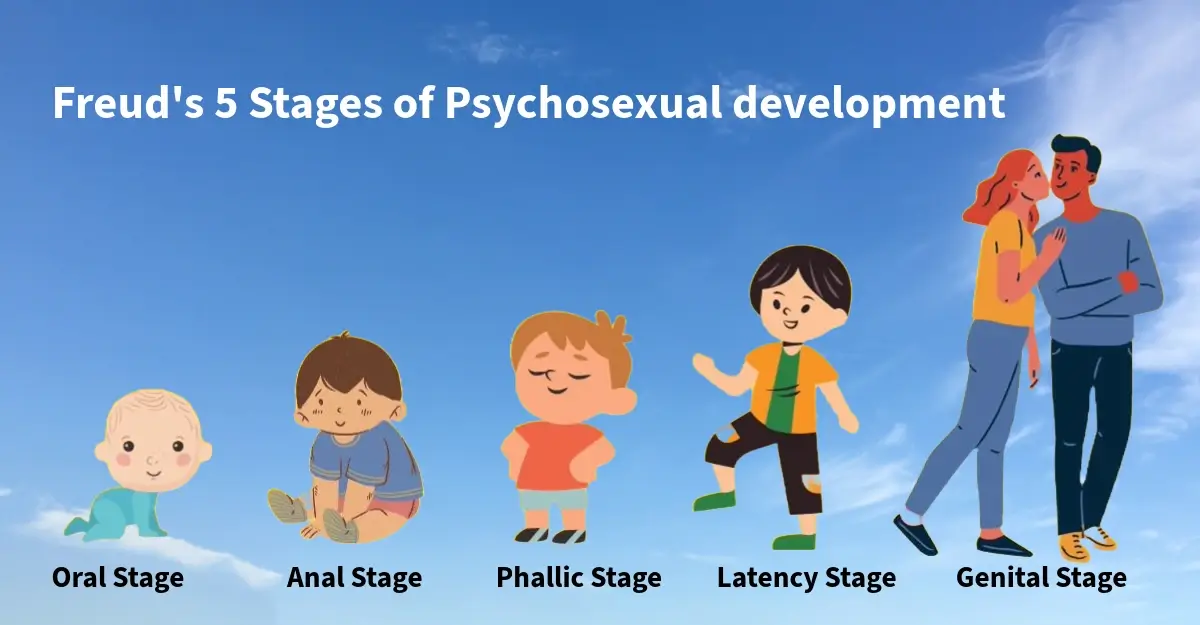The five stages of psychosexual development were proposed by Sigmund Freud, and they are part of his theory on how human personality develops. According to Freud, early childhood experiences significantly shape a person’s adult personality. The five stages are:
1. Oral Stage (Birth to 1 year)
- Focus of Pleasure: The mouth (sucking, biting, and breastfeeding).
- Key Developmental Tasks: Infants derive pleasure from activities involving the mouth, such as sucking, chewing, and biting. The oral stage is crucial for forming a sense of trust and security.
- Possible Fixations: If needs aren’t met during this stage, it may result in fixation, leading to oral behaviors in adulthood, like smoking, overeating, or excessive talking.
2. Anal Stage (1 to 3 years)
- Focus of Pleasure: The anus (toilet training and control over bodily functions).
- Key Developmental Tasks: This stage involves the child’s struggle with control over bodily functions, particularly during toilet training. Successfully navigating this stage helps develop a sense of autonomy and control.
- Possible Fixations: An overly strict or lenient toilet training process can lead to either an anal-retentive personality (excessively neat, stubborn) or an anal-expulsive personality (messy, disorganized).
3. Phallic Stage (3 to 6 years)
- Focus of Pleasure: The genitals.
- Key Developmental Tasks: During this stage, children begin to become aware of their bodies and sexual differences. Freud proposed the Oedipus complex (for boys) and Electra complex (for girls), where children experience feelings of desire for the opposite-sex parent and jealousy toward the same-sex parent.
- Possible Fixations: Fixations at this stage can lead to problems in relationships, feelings of inadequacy, or issues with authority in adulthood.
4. Latency Stage (6 to 12 years)
- Focus of Pleasure: Sexual feelings are dormant, and children focus on social and intellectual development.
- Key Developmental Tasks: During this period, children engage in learning, hobbies, friendships, and developing social skills. There is a focus on peer relationships and developing competence.
- Possible Fixations: Freud believed that the latency stage was crucial for building the foundation of adult relationships and a strong sense of self.
5. Genital Stage (12 years and beyond)
- Focus of Pleasure: The genitals and mature sexual relationships.
- Key Developmental Tasks: In this stage, individuals develop a mature sexual identity and enter into adult relationships. The focus is on sexual intimacy, love, and forming healthy, balanced relationships.
- Possible Fixations: If earlier stages were resolved successfully, the individual can form healthy relationships, while unresolved conflicts may affect adult relationships.
Key Points to Remember:
- Fixation: If a child becomes fixated at a particular stage, they may carry certain behaviors and personality traits associated with that stage into adulthood.
- Controversial Nature: Freud’s theory has been criticized for its emphasis on sexuality in childhood and its limited empirical support.
- Influence on Psychology: Despite its limitations, Freud’s theory has had a significant impact on the field of psychology and continues to be discussed and debated.
It’s important to note that while Freud’s theory has historical significance, contemporary psychological perspectives offer more nuanced and evidence-based explanations of human development.
✅ Learn About Biochemical Oxygen Demand (BOD) in Our Comprehensive Guide

Ameer M, founder of GovtJobsNet.com, helps job seekers with accurate govt job updates and exam tips. | அரசு வேலை வழிகாட்டி, நம்பகமான தகவல்களை வழங்குபவர்.
